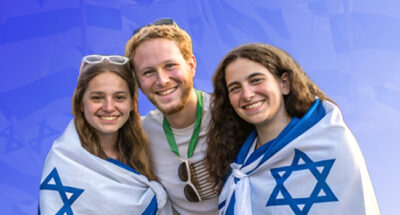Sir Isaiah Berlin developed the idea that there are two types of freedom: “Freedom from” and “freedom to.”
“Freedom from” is the absence of constraints and restraints. It is freedom from authority or responsibility. “Freedom to” is the idea that an individual has the capacity to make autonomous decisions toward a goal or an idea.
Using Berlin’s dichotomy of “freedom from” and “freedom to,” how can we identify what freedom means in 2022? What are we collectively seeking freedom from this year and what do we seek freedom to do or become?
Amid the recent, devastating wave of terror that has killed 14 Israelis, this Passover, many Jewish people wish for the freedom of living a normal life without worrying about whether they or their families will come home safely at night.
They seek the basic freedom to go to a restaurant or coffee shop, take a bus, or walk on a busy street without fear of being attacked.
In the language of Passover, these circumstances would be considered a form of “metzar,” meaning “a narrow place,” “troubles” or “distress.”
Passover is the story of the Jewish people’s Exodus from Mitzrayim (Egypt) to the Promised Land, symbolizing the journey from slavery to redemption. The root of Mitzrayim is metzar, “troubles.”
“Min hametzar karati Y-ah,” Tehillim (Psalms) 118 states. “From the metzar, I called out to God.” It is in the place of distress, of confinement that we need God the most.
It is also the place where we are called to hold fast to who we are, in the face of pressures to hide from or forget our identity. The Biblical character Joseph, who maintained his identity when he was in the depths of despair, was a model of this.
Even when Joseph was in jail, the bottom of a pit, or sold by his brothers into slavery, he always kept his identity. Later, after Joseph died, Moses brought his bones (atzmot Yosef) out of Egypt (Shemot/Exodus 13:19). Why is this so important? Atzmot Yosef does not just mean the bones of Joseph; it also means the “essence” of Joseph.
Moses thought it was critical to bring atzmot Yosef and the “essence” of Joseph on the journey out of Egypt. It was crucial to the process of liberation and freedom.
When Palestinians vandalized Joseph’s tomb two days in a row this past week, throwing rocks and setting fires in the site, they were symbolically attacking our liberation, our freedom. They were attacking the bones of Joseph and what they represent which was important enough to bring with us during the Exodus.
On Passover we not only retell the story of the Israelites leaving Egypt, but we also envision our own freedom from our metzarim. The Haggadah says, “In every generation, one must see (lirot) oneself as if they had personally left Egypt.”
The medieval scholar Maimonides (Rambam) wrote this differently: “In every generation, one must show (liharot) oneself as if they are just now leaving the slavery of Egypt.” Rambam focuses us on the present as well as the past. He asks us to envision and enact our own liberation from our metzarim.
For the past two years, our metzar on a collective level was Covid-19. We sought liberation from being confined in our homes, the freedom to travel and the ability to hug our close family and friends.
This year, we identify with the metzarim of the Ukrainians who want security and peace, and the freedom to choose their own destiny, free from Russia’s violent interference.
There are also personal metzarim that we seek liberation from. This could be a job or relationship, financial stress, an addiction or unhealthy habit, a health issue, or a loss or personal tragedy.
It could also be a harmful psychological pattern, like setting impossible standards for ourselves, being either overly harsh with ourselves or overconfident and arrogant, or comparing ourselves to others.
On Passover we imagine and act out (liharot) what it would mean to liberate ourselves and others from these circumstances, and what role we could play in making that happen.
Even if we are not personally experiencing a time of great distress, the Haggadah still instructs us to identify with the metzarim of the collective Jewish people and the world.
“Hashta avdei, leshanah haba’a b’nei chorin!” “Now, slaves, next year, free people!” we read every Passover regardless of whether we feel like we are in “a narrow place” or not.
A story illustrates why we do this. Rabbi Yisrael Meir Lau, the former Israeli chief rabbi, once went to an Israeli Air Force base for Passover. There were over 1,000 people there, and Rabbi Lau was leading the soldiers in a seder.
When the soldiers read the line from the Haggadah, “Hashta avdei, Leshanah haba’a b’nei chorin! Now, slaves, next year, free people,” some of them said, “I don’t understand, this doesn’t make sense. We are in Israel, we made it! Why do we say this?”
“This text cannot be speaking to us,” one soldier told Rabbi Lau. “I am a Sabra. I’ve lived in Israel my whole life. What does ‘Next year in Jerusalem’ mean?”
Rabbi Lau, who had survived Buchenwald, responded, “I used to learn from the great rabbinic luminaries, from Rabbi Eliahu Lopian and Rabbi Shlomo Zalman Auerbach, and on Yom Kippur they would say, ‘Al het [for the sin of] this and that.’”
“Do you really think that these Jewish sages committed the worst sins?” Rabbi Lau asked the soldiers. “On the holiest day of the year, could these great rabbis lie?”
“Of course not,” he continued, “but they said these words because they did not only think about themselves. They did not just think about ‘Ani, Ani, Ani.’ Like these great sages, we too need to think about others. We need to think about all the Jewish people and the entire world.”
This is the idea of the Haggadah and the idea of Passover: It’s not just about me. The Haggadah is a text for the collective and the individual. It expresses the core Jewish value of areyvut — collective responsibility and sense of obligation and belonging to Am Yisrael. It teaches us the concept of “peoplehood” in the truest sense.
This sense of belonging and membership in Am Yisrael is what many Jews in the Diaspora have been feeling as terror attacks have struck Israel thousands of miles away.
It is what Israeli Prime Minister Naftali Bennett was articulating when he said after the third victim of the attack in Tel Aviv, Barak Lufan, succumbed to his wounds: “The entire nation of Israel shares the family’s heavy grief.” We feel the pain and heartache of others as if it is our own.
Part of the purpose of leil haseder, the night of the seder, is to identify with the pain and the metzarim of others, and to feel the sense of communal responsibility that we all share. The text of the seder can guide us to step out of ourselves and feel for others, identify with others and think about others.
But ultimately, that feeling and identification with the community is only the first step. We identify with the “narrow places” of Am Yisrael and the world for the purpose of being motivated to serve others, to help ourselves and others become free.
If our transformation is complete, we recommit to being 4:14 Jews, to taking action and standing up for others and what is right.
Perhaps the subtle and brilliant idea of the Baalei haHaggadah (authors of the Haggadah) is that by learning how to care for others, we will transform how we care for ourselves as well.
When we identify with others, and help liberate them, we liberate ourselves too. And, in the words of the late Rabbi Jonathan Sacks z’l, when we liberate ourselves, we have the freedom “first to [stand] proud and tall as Jews, and second to work for the freedom and justice of all.”
From our team at Unpacked for Educators, we wish you and your family a redemptive and liberating Passover experience.



